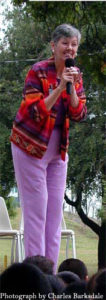I tend to separate the two: emceeing, introductions. The emceeing has to do with the overall program and the audience, welcoming, making the program flow, cleansing the palate between each teller, building anticipation for the next story, bringing closure. The introductory “speech” for each teller is a separate project consisting of gathering information ahead of time, editing it and framing it compactly in such a way that will make the audience feel like “this is gonna be good; I can relax and just experience it.”
I prefer to hear and give and receive brief introductions but not downright skimpy ones that leave me wondering who this guy is, anyway? Something short and clever that acknowledges my own admiration of the teller, something I know that the audience doesn’t, like something s/he is known for within the storytelling community, where s/he’s from, someplace impressive s/he’s performed before, something funny s/he once said to me… I try to make all that (or whatever) into a 3- or 4-sentence “story.”
While I understand that some might wish to be introduced with just their name, I can’t imagine that doing that would contribute to an overall good program, especially if it is an olio type program. Do you introduce ALL the tellers with name only? And even if it is a program with only one performer, I think I would be tempted to stretch the introduction, maybe something like “Our guest today doesn’t want me to tell you about all her skills and honors and personal history, though, with a bit of work and if I talked very fast, I think I could pare that down to a fairly digestible account. She just wants me to tell you her name, and since you came here for stories, maybe that’s what you want, too, so please help me welcome….”
The reason I would do it this way, is that I think things can happen too suddenly. People need a moment to know that the welcome-and-turn-off-your-cellphone part is over, so they can shift to a position in which they’ll be comfortable for a while to listen. They need to finish or put on hold the whispered conversation they were having with their neighbor before it all began so they can move on.
Another thing that I think is a characteristic of good emceeing is to make the transition between storytellers by thanking or commenting upon the previous teller. Nothing jerks me out of the space more than watching one performer leave the stage and the emcee come up, maybe whiz past them onstage without even an appreciative nod of the head, and introduce the next storyteller like nothing ever happened before. Like checking names off their list. Like we’re starting over from scratch. Like time is episodic. I need the emcee to say something that acknowledges what just happened and lets me leave it naturally, safely, not just to be jerked into the next segment. Oh sure, I get over it, but why must I when it’s so easy to just give an appreciative sentence? My favorites pull a reference from the person’s own story in some brief way so that it seems like the (mentally very busy) emcee was listening as deeply as I was, like it was an experience we all shared–which we did, except for the emcee who had a job to do!
Emceeing and preparing and giving introductions are skills we are all called upon to use, and how I do it reflects on me as surely as telling a story myself. I want to do it with poise and grace. And, yeah, I want people to say “Next time, let’s call HER to do the program!”–
Author’s Bio:
From Ali Baba to La Llorona, Tiger to Turtle, or Vasalisa to Jack, folktales, fairy tales, and legends from all around the world come alive in the graceful hands and enchanting voice of Storyteller Mary Grace Ketner.
An author with teaching experience in Language Arts, English, Spanish, and Special Education and work as an educational specialist in a museum of history and culture, Mary Grace understands the role of artistry in advancing a community of learners. Her interactive story programs address the scope and sequence of each grade’s Social Studies content as well as the TEKS for language arts.
Mary Grace has been selected for inclusion in the Texas Commission on the Arts Touring Roster, 2008 – 2010.
